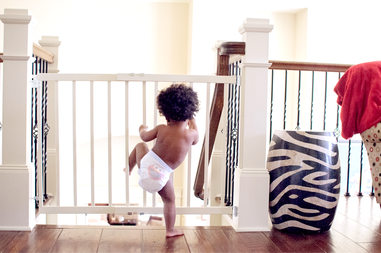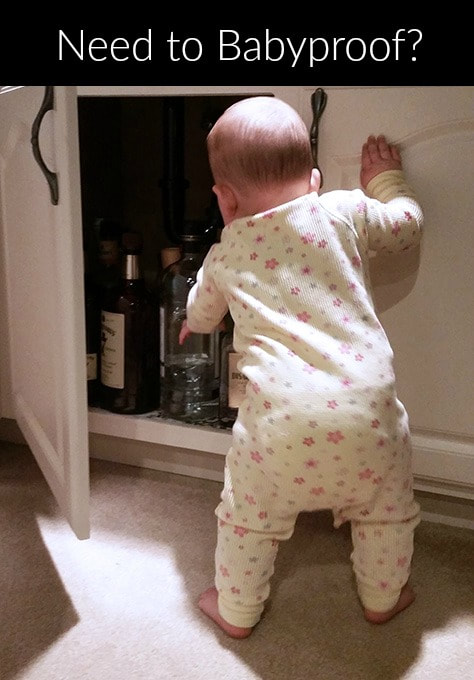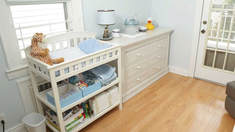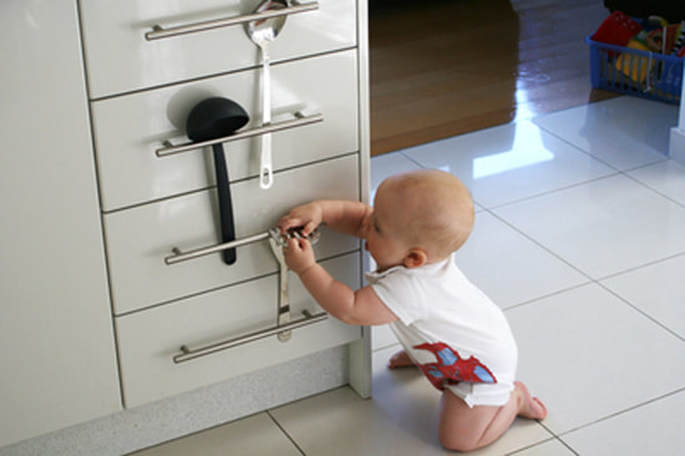
What will your baby get into once he's crawling ? Walking ? Able to climb? It's hard to tell -- and that's why it's important to baby-proof your home. Making a house baby-safe means ensuring that whatever he might try to open, pull on, or play with won't hurt him. It also means making sure you have all the safety basics covered, such as confirming that all your smoke alarms have batteries (and that they work!) and that you have emergency phone numbers posted near all your phones.
Put aside one weekend to secure your house, room by room, to make it safe. It may only take you several hours total, and getting it out of the way will give you peace of mind, even though you'll need to update your efforts as your child grows.
Consider how generally safe your house is. Your hot-water heater should be set below 120 degrees F so you won't scald your baby at bathtime. You'll need a fire extinguisher in the kitchen. You'll also want smoke detectors and carbon-monoxide detectors on each floor of your home. Be sure to place safety gates at the head and foot of your stairs, and cover electrical outlets with plastic caps. (Keep track of the supplies you'll need on a master shopping list.)
Another smart step is to check your basement, especially if you're down there often. Make sure paint and other hazardous substances are stored in airtight containers on high shelves in a cool, dry area.
You're often distracted while you're in this room -- cooking, cleaning -- so you want to be sure your child can't get into trouble if you turn your back for a second.
First, reorganize. If you have cleaning supplies and detergents in low cabinets, move them to the very top ones instead. Bottom cabinets (even if you use safety latches) should hold things that are safe for baby to find -- pots and pans, plastic containers, and paper products, for instance. The same goes for drawers -- move plastic and paper bags (suffocation hazards) and anything sharp to high drawers, and put safe things lower.
If you use vitamin or mineral supplements, keep them in a hard-to-reach drawer or cabinet with a safety latch -- they look like candy and can poison a curious kid. (Child-resistant caps aren't foolproof; they just take a persistent toddler a little longer to open.)
You may want to place choking hazards, such as magnets, up high too. Last, unplug small appliances (toasters, coffeepots) when not in use, but don't let the cords dangle.

Kitchen:
Stove-knob covers, to prevent baby from turning on the burners.
Nonskid pads for rugs.
Latches for cabinets and drawers that contain harmful products (once your baby can climb, he can reach anything.)
Falls and collisions with furniture are the biggest dangers to your baby in this room, so you'll want to add cushioned corner guards or edging to coffee and side tables, hearths, and any other sharp-cornered surfaces.
Baby might also get the idea to climb on furniture. Move everything away from your windows so baby can't climb up and fall out. Mount bookshelves to walls so they can't topple over. Attach the TV securely to an entertainment center or table so baby can't pull it down on herself. All knickknacks are fair game for baby's play, so if you don't want her to touch something, store it away. Think about these items for your family room:
Cordless blinds (the cords on blinds and curtains are strangling hazards).
- Heavy-weight picture hooks to prevent pictures from falling off the wall.
- Electrical tape to secure electric cords away from baby.
Nursery Security Detail

Is baby's crib safe? Chances are if it's new, you're fine -- but hand-me-downs more than five years old may not meet current safety standards. For example, crib bars must be no more than 2 3/8 inches apart.
Remember that until baby is older than 6 months, he could potentially suffocate on bedding such as pillows and blankets, as well as stuffed animals. Save them for toddlerhood and remember to lay him on his back to sleep, which helps prevent sudden infant death syndrome (SIDS). You should also make sure his sheets and mattress fit tightly. Possible additions to your shopping list:
- A thick piece of carpet or a rug to cushion falls.
- A safe toy box -- ideally an open bin (boxes with heavy lids can trap baby's head).
- UL-listed night-lights and replacement bulbs.
- Finger-pinch guards for hinges on doors.
Finishing Up with the Bathroom
The most crucial piece of advice: Don't leave your child alone in here, and especially don't leave your child alone in the bathtub, even for a second. Babies can drown in a few inches of water; don't run out to answer the phone or do anything else unless you pull your child out and take him with you. Then, as you did in the kitchen, move harmful products to high shelves, and remove all electrical appliances and their cords to avoid electrical dangers. Some more purchases to put on your shopping list:
- Latches for the medicine cabinet.
- A toilet lock.
- A thermometer to ensure baby's bathwater is a safe temperature.
The Small Stuff
You've covered the big tasks; now it's time to attend to the small details. Go through each room and take the following measures:
- as a formal living room.
- Make sure all of your houseplants are nontoxic varieties. Some plants are extremely poisonous.
- Empty ashtrays promptly and keep matches, lighters, and tobacco products locked away from baby.
- Vacuum regularly to suck up loose change, paper clips, or any small item that can cause choking.
- Place locks on liquor cabinets; alcohol can be poisonous to young children.
- Cover radiators and heating vents to prevent burns.
- Check your doorstops; many have removable caps that pose a choking hazard.
- Keep toy batteries safely stowed away; they can leak acid, causing serious burns.
- Clear cosmetics and shampoos off sink and tub ledges, as they pose a poison risk.
According to a recent study conducted by the Home Safety Council, children under 1 have the highest rates of unintentional home-injury death of all children under 15, with choking and suffocation topping the list as the biggest hazards.
